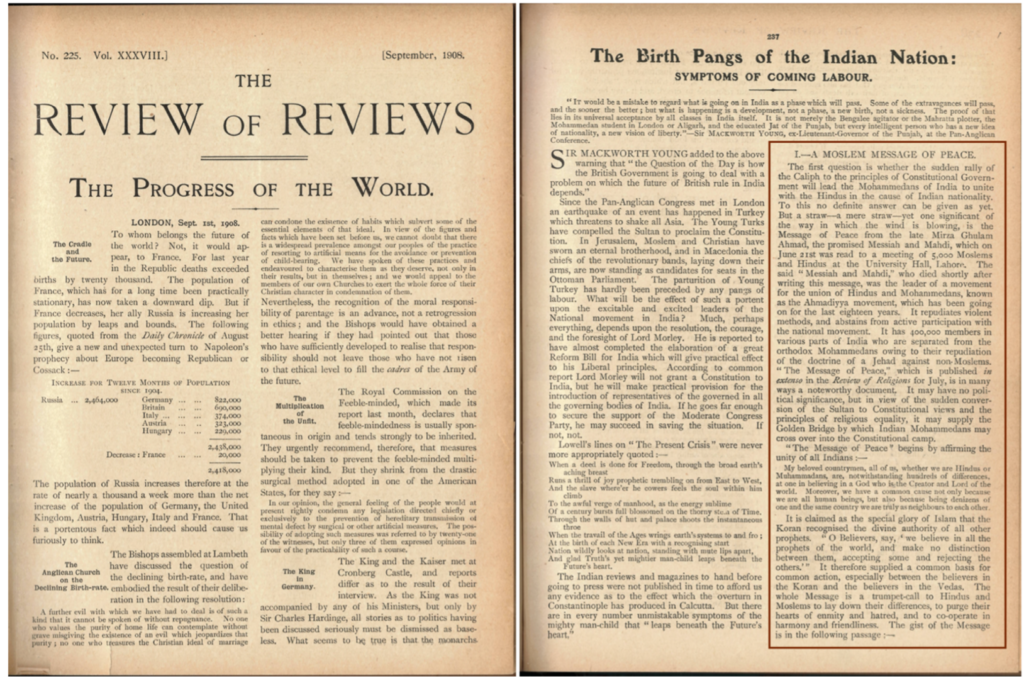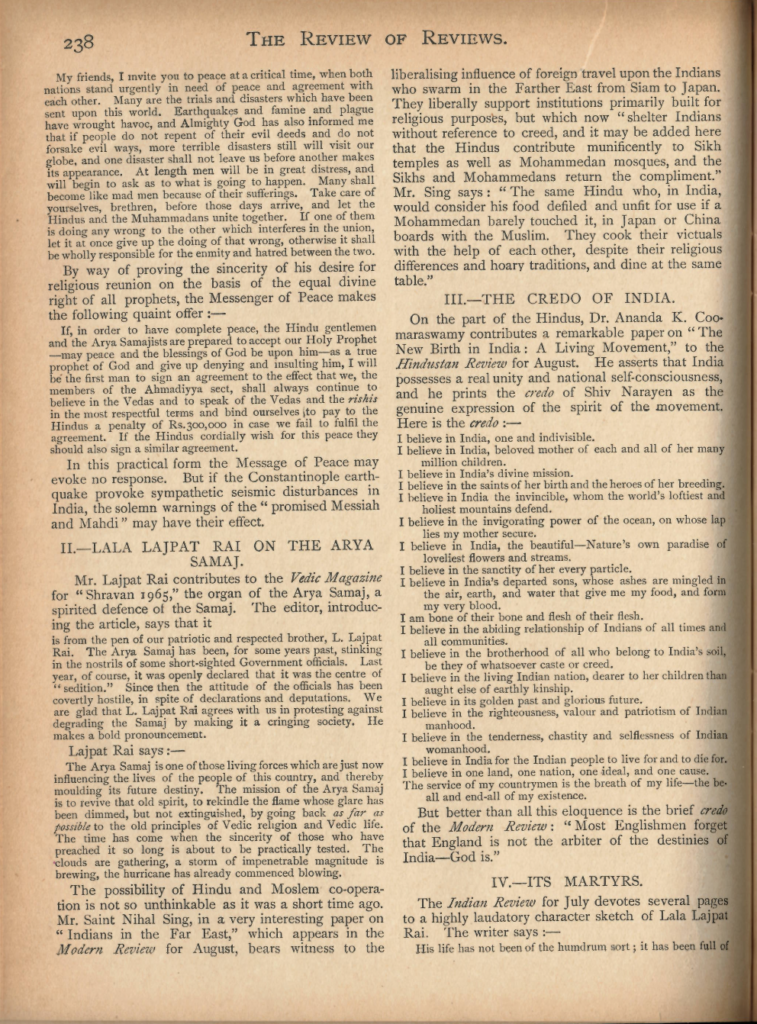A religion which does not inculcate universal compassion is no religion at all. Similarly, a human being without the faculty of compassion is no human at all.
(A Message of Peace P.6)
The Message of Peace,” the final literary work penned by the Promised Messiahas, was composed within a remarkably brief span of two days, from May 24 to May 26, 1908, just prior to his passing. Within this book, the Promised Messiahas passionately appealed to two significant nations of India, namely the Hindus and Muslims. He unequivocally proclaimed that the teachings of Islam explicitly promote respect and reverence for one another, including their elders and leaders, and encourage the demonstration of deference towards their values and religious sensitivities. Moreover, he emphasized that as Muslims, they hold the divine figures of Ram Chanderji and Krishna in high regard as saints, and they acknowledge the Vedas as revelations from God. The Promised Messiahas urgently implored the Hindus to exhibit tolerance, and understanding, and extend a hand of friendship towards the Muslim community.
In our other articles, we have covered how the Christian missionaries would falsely report about the Promised Messiahas to their missions and the government that he was hostile towards the Christian faith. The Promised Messiahas throughout his life made it clear that he was not the enemy of anyone rather he is the enemy of false beliefs and that his replies are in response to the Christian and Hindu vilification of his holy master Muhammadsa. He stated in one of his books:
“I proclaim to all the Muslims, Christians, Hindus, and Aryas, that I have no enemy in the world. I love human beings with the love that a compassionate mother has for her children and even more so. I am the enemy only of the false doctrines which slay the truth. Human sympathy is my duty, and discarding falsehood, idolatry, every type of misconduct and wrongdoing, injustice, and immorality, is my principle.”[1]
He reiterated this sentiment in his final message of peace. The Promised Messiahas wrote:
“As for us, we never use indecent language with regard to the Prophets of other peoples. In fact, we believe that for all the Prophets who have come to different peoples of the world and have been accepted by millions of people in all parts of the world, and love for them and their greatness has been firmly established in any one part of the world, and further that this state of devotion and love for them has endured the test of time, is evidence enough of their truthfulness. Had they not been from God, they could not have been accepted on such a wide scale by millions upon millions of hearts. God does not bestow such honour upon those whom He favours not. If an imposter aspires to occupy their position, he is soon brought to ruin.”[2]
Furthermore, he put forth a proposition that if the Hindus, particularly the Arya Samajists, were to acknowledge our Prophet (may peace and blessings of Allah be upon him) as a genuine Prophet of God and commit to refraining from derogation and defamation in the future, he and his community would be the first to endorse the following treaty.
“We, the members of the Ahmadiyyah Jama‘at, will testify to the truth of the origin of the Vedas, and will speak of the Vedas and their Rishis with respect and love, and if we do not honour our part of the contract, we will be liable to pay a fine of not less than three hundred thousand rupees to the Hindu community.”[3]
But he also clarified:
“How can we ever be at peace with such people who without justification and without regard for the fear of Allah speak of our Holy Prophet, Hadrat Muhammad (may peace and blessings of Allah be upon him) with disrespect, and abuse him and refrain not from the use of foul language? In truth, I declare that it is possible for us to make peace with the serpents fed on brackish soil and the wolves of the wilderness, but not with those who make wanton attacks on our Holy Prophet (may peace and blessings of Allah be upon him) who is dearer to us than our lives, our mothers and our fathers….. Here, I do not wish to censure any particular people, nor do I intend to hurt anyone’s feelings. But, with a deep sense of mortification, I observe that Islam, being a religion of peace, never attacked the founder of any religion. The Qur’an is that revered book which laid the foundation of peace between nations and acknowledged the truth of all Prophets belonging to all the different nations.”[4]
The intention was for the paper to be presented in Lahore on May 31, 1908. However, in accordance with the frequent revelations he had been receiving, the Promised Messiahas was called by his Creator. Nevertheless, the paper was eventually read on June 21, 1908, at the Panjab University Hall in Lahore, in the presence of a gathering of over five thousand men, which included many esteemed leaders from both Hindu and Muslim society. society.[5]
Later, the paper was published in book form. In a world afflicted by intolerance towards cultural, racial, and religious differences, its message stands as a remedy for the societal ailments we face today. Remarkably prophetic and universally relevant, this book provides a pathway towards the peaceful coexistence of all human beings, with the central theme of worshipping the One God.
The lecture was additionally covered in the September edition of a British journal called “The Review of Reviews.”
After quoting from the paper, it is written “In this practical form the Message of Peace may evoke no response. But if the Constantinople earthquake provoke sympathetic seismic disturbances in India, the solemn warnings of the “promised Messiah and Mahdi” may have their effect.”[6]


The passing of the Promised Messiahas deeply impacted the members of the Movement, leaving them profoundly shaken. The community found themselves bewildered and, in their time of overwhelming grief, turned to humble and sincere prayers for guidance. It was undoubtedly a period filled with fear for the believers. However, as per Allah’s promise, peace and security were bestowed upon them through the emergence of the second manifestation, known as the Khilafat. Hazrat Maulana Hakeem Noorudeenra, the first person to believe in him, the most knowledgeable among them, and the most righteous individual among them, was unanimously chosen as the first Khalifa of the promised Messiahas. This unanimous agreement following the demise of the Promised Messiahas solidified the true understanding of the second manifestation and the future form of leadership, which is the system of Khilafat.
Many press notices were published on the demise of the Promised Messiahas.[7] One such eulogy was published by the Pioneer, Allahabad on May 30th, 1908:
“If one of the Prophets of Mount Carmel could return from the upper world and resume his mission among mankind, he would hardly be a more incongruous figure among Twentieth Century surroundings than was Mirza Ghulam Ahmad Khan of Qadian, whom death has overtaken, as it overtakes all in these days, at his home in the Panjab. Of late years the Mirza under the influence of advancing years had relapsed into quietude, but at one time his name his was as familiar to people out here as that of Dr. Booth. His position as a Muhammadan theologian we are not qualified to appreciate but it is certain that he had at one time a very large following, the result of his personal influence and teaching. Mirza Ghulam Ahmad never doubted of himself or his calling and believed with absolute sincerity that he had been endowed with inspiration and of but instead of living in the Eighth century BC, his lot was cast in the Nineteenth AD, and he had to accommodate himself to his surroundings. So instead of going off to the desert and taking up his abode under a guord or in a cave, he took in the newspapers, joined in current controversies, retained a good citizen and a loyal adherent of the British Government. Yet sometimes the other side of his nature would get the upper hand, as when he challenged the astonished Bishop Welldon to a contest of miracles after the manner of Elijah and the priests of Baal, the result to decide once for all which was the true religion. Even then the Mirza was ready to accept every modern guarantee against deception, but the Anglican champion would not take up the appeal Those who have moved the world in religion have been much more akin to Mirza Ghulam in temperament than to a modern Archbishop of Canterbury. Had Ernest Renan been in India during the last twenty years. he would certainly have gone and studied the Mirza, and the result might have been some added flashes of insight in the wonderful account of the prophets of Israel.”[8]
[1] Essence of Islam, vo. IV, pp. 164-166. Original Urdu from Arba‘in No. 1, Ruhani Khaza’in, vol. 17
[2] A Message of Peace P.22-23
[3] Ibid P.27
[4] Ibid P.31
[5] The Review of Religions July 1908
[6] The Review of Reviews No 225, September 1908
[7] The Review of Religions June 1908
[8] The Pioneer, Allahabad May 30th, 1908

Related Articles
‘A Warning to a Pretender to Divinity’
Revival of Faith: A Universal Search for a Reformer